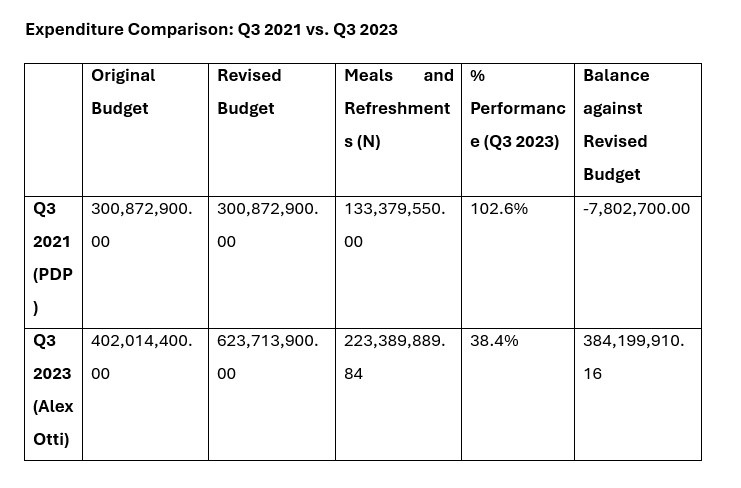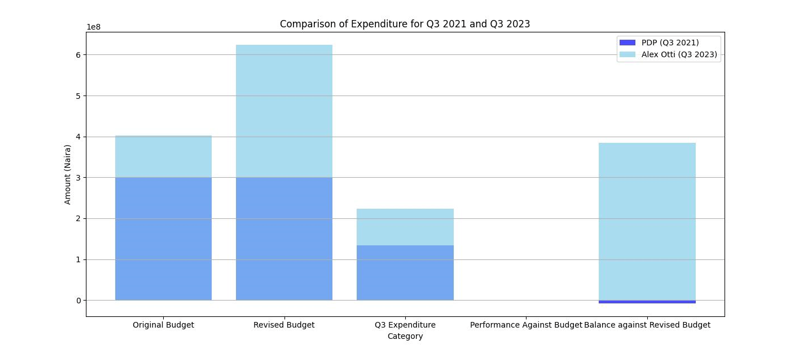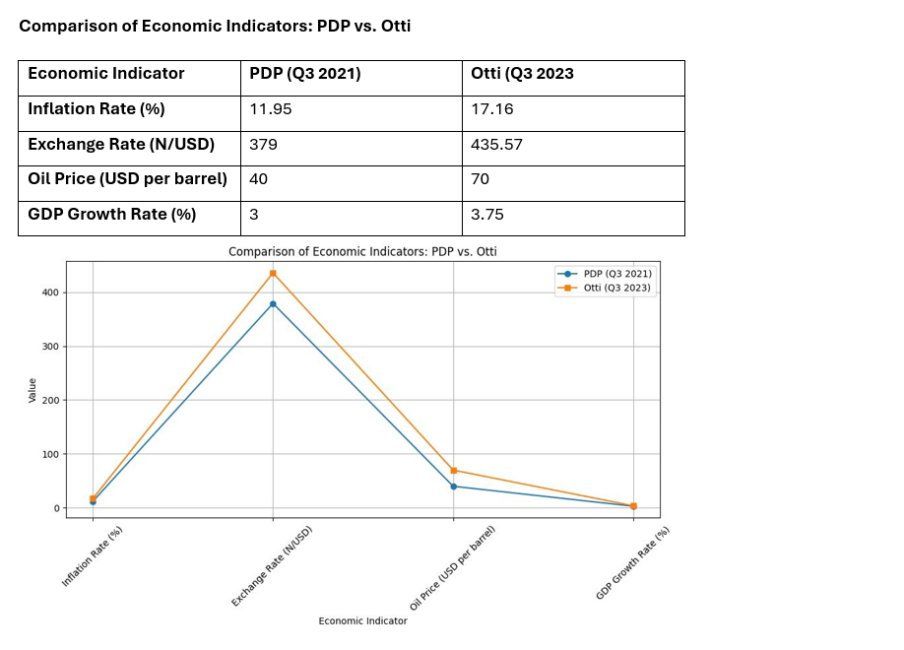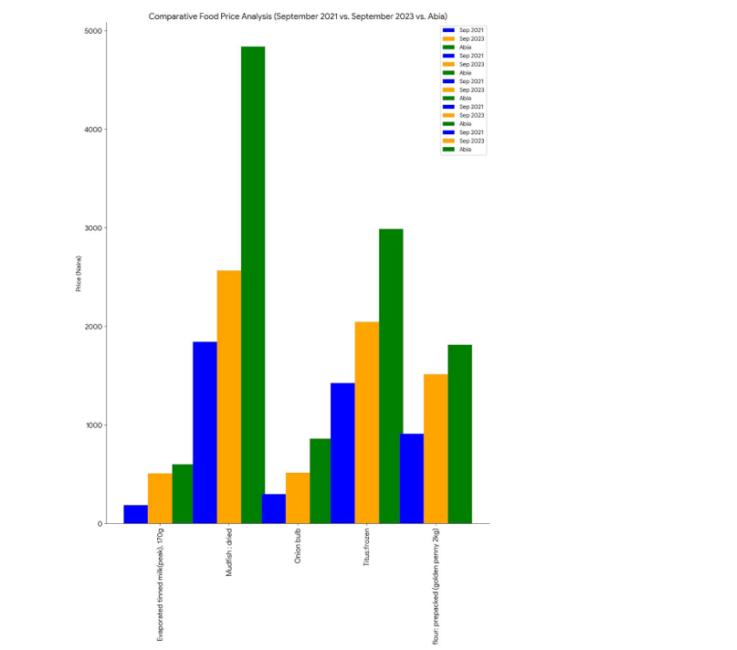Governor Otti’s Prudent Fiscal Approach, Demonstration Of Commitment To Responsible Financial Management
In recent times, the Abia State government has been subjected to a barrage of unfounded accusations and misrepresentations regarding its Q3 expenditure. These claims, which have circulated widely through social media and some media outlets, have painted an inaccurate and unfair picture of the government’s financial management.
The core of the controversy surrounds the reported expenditure on meals and refreshments. Initial reports alleged that Governor Alex Otti had spent an exorbitant amount of N927 million on these items, sparking outrage among some quarters of the public. However, these claims have been vehemently refuted by the government, which has provided clear and detailed explanations to set the record straight.
Advertisement
Contrary to the sensationalized figures circulating in the public domain, the official data reveals a more nuanced and responsible approach to financial stewardship. The Q3 expenditure report, when scrutinized with attention to detail, presents a different narrative—one that underscores the commitment of the government to transparency, accountability, and prudent fiscal management. The alleged N927 million expenditure on meals and refreshments is not only misleading but also misrepresents the actual figures. The official data reveals a total expenditure of N223,389,889.84, significantly lower than the sensationalized amount. This disparity emphasizes the need for a more precise and sophisticated assessment of the financial condition.
Critics have pointed to the increased allocation for meals and refreshments in the 2023 budget as evidence of extravagance. However, it is important to consider the context of this increase. The 2023 budget was revised upward to reflect the higher oil price and improved economic outlook. Moreover, a comparison with the previous administration’s spending on meals and refreshments reveals that Governor Otti has been far more judicious in this regard.
Governor Otti inherited a state grappling with significant challenges, including infrastructural deficits, a struggling economy, and concerns about public welfare. To address these issues, his administration has embarked on an ambitious agenda that requires various expenditures, including those related to official functions, outreach programs, and support for vulnerable groups. The expenditures in question, while subject to scrutiny, are not merely incidental expenses but rather investments in Abia’s future. By supporting official functions, outreach programs, welfare initiatives, special events, such as retreats, conferences, and related events, the government is laying the groundwork for a more prosperous and equitable Abia State.
To gain a clearer perspective, it is worthwhile to compare Governor Otti’s Q3 expenditure to that of previous administrations. A detailed analysis reveals that Governor Otti’s spending falls within the range of historical spending patterns.
Advertisement
Q3 2021 vs Q3 2023
PDP’s administration displayed robust spending on meals and refreshments, with a performance of 102.6% against the revised budget in Q3 2021. However, the final budget for Q4 2021 witnessed a significant increase, indicating a potential lack of budget discipline. Under Governor Alex Otti’s leadership, Q3 2023 reveals a more measured approach. Despite a higher original and revised budget, Otti’s administration achieved a performance of 38.4%, showcasing an astute allocation of resources and fiscal restraint.
Governor Alex Otti’s administration faced economic headwinds, including an inflation rate of 17.16% and an exchange rate of N435.57 per US Dollar. Despite these challenges, Otti’s Q3 2023 performance stands at 27.4%, signalling an adept navigation of economic complexities while maintaining a commitment to social support. Comparing the two administrations, it is crucial to consider the economic indicators influencing their decision-making.
The recent Selected Food Price Watch for September 2023 highlights the significant increase in the prices of essential food items. Beef, a staple protein source, has seen a 28.08% year-on-year price hike, while rice, a key carbohydrate source, has experienced a staggering 60.59% increase over the same period. These price increases are reflective of the broader economic challenges faced by the country, including inflation and supply chain disruptions.
Abia state, in particular, recorded the highest average price of 1kg of onion bulb with N862.35. Additionally, regional analysis revealed that the average price of 1kg of boneless beef was highest in the South-East with N3,550.75, while the average price of 1kg of local rice sold loose was highest in the South-East with N901.26. Similarly, the South-East recorded the highest average price of 1kg of brown beans (sold loose) with N995.76.
Advertisement
Governor Alex Otti’s prudent fiscal approach in Q3 2023, against the backdrop of challenging economic conditions, demonstrates a commitment to responsible financial management. It is evident that Governor Alex Otti’s unwavering commitment to fiscal responsibility is crucial in preventing the state from succumbing to the economic turmoil that would have befallen it under the previous administration’s mismanagement. The measured allocation of resources and social support, juxtaposed with the economic indicators, paints a picture of a leader navigating complexities with astuteness and a keen eye on the well-being of the people. It is important for critics to recognize the subtleties of financial management and the delicate balance that must be struck in order to manage state resources properly.





Advertisement
The Abia State Food Price Watch for September 2023 shows that there has been a significant increase in the prices of essential food items compared to September 2021. The average price of a 170g tin of evaporated milk (peak) has increased by 169% from N187.31 in September 2021 to N508.39 in September 2023. The average price of 1kg of dried mudfish has increased by 39% from N1,844.74 in September 2021 to N2,566.09 in September 2023. The average price of 1kg of onion bulbs has increased by 73% from N298.94 in September 2021 to N515.59 in September 2023. The average price of 1kg of frozen tilapia has increased by 44% from N1,426.42 in September 2021 to N2,045.95 in September 2023. The average price of 2kg of pre-packed wheat flour (Golden Penny) has increased by 66% from N911.88 in September 2021 to N1,515.88 in September 2023.
It is important to note that the original 2023 budget was prepared by the past administration. Despite the significant increase in food prices, Governor Alex Otti’s spending is still within the limit of the original budget. This is a testament to his commitment to fiscal responsibility. Had the current economic climate prevailed in 2021, the previous administration’s unrestrained spending habits would have undoubtedly plunged the state into bankruptcy. Their reckless financial decisions would have left Abia teetering on the brink of economic collapse, burdened by an unsustainable debt crisis.



